Two women caned for gay sex in Malaysia, ‘atmosphere of persecution’ stokes fear in LGBT community
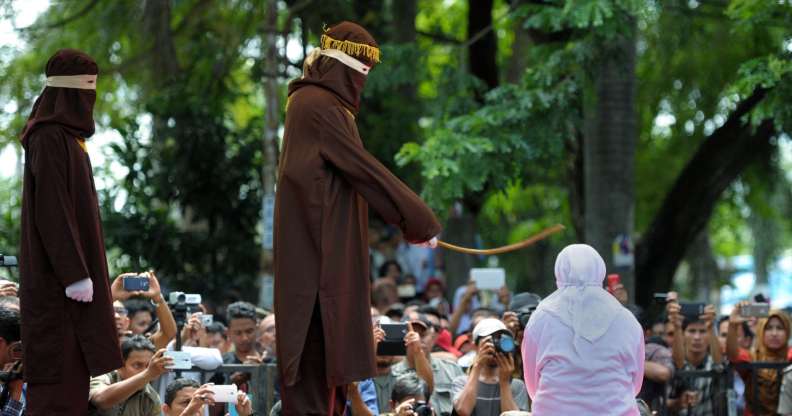
File photo. The women in Terengganu were caned six times each (CHAIDEER MAHYUDDIN/AFP/Getty)
Two women in Malaysia have been caned six times each for having gay sex.
The punishment was delayed last week because of “technical reasons,” but was carried out on Monday in front of a crowd of around 100.
The sentence was handed down last month once the women, who are 32 and 22, had pleaded guilty after Sharia enforcement officials in the northeastern state of Terengganu found them having sex in a car.
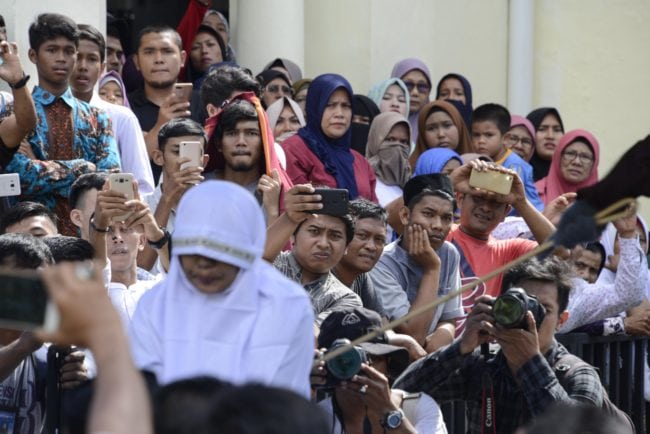
A woman is whipped for a Sharia law violation in Indonesia (CHAIDEER MAHYUDDIN/AFP/Getty)
The women have also been fined RM3,300 (£630) each, with a four-month prison term if they fail to pay.
Gay sex is banned in the country, which groups it together with bestiality in a list of offences which are “against the order of nature.”
Rachel Chhoa-Howard, Amnesty International’s Malaysia Researcher, told PinkNews that the “appalling” canings seemed to be unprecedented.
“To our knowledge, this is the first time this punishment has been imposed in the country for same-sex relations in this way, for this so-called crime.
“We believe that a lot of the time punishments are meted out in private,” said Chhoa-Howard.
The fact that this was carried out in a courtroom, in front of activists, officials, family members and dozens of onlookers, was, she said, “a sign Malaysia is becoming a more hostile place.”
“We’re incredibly disappointed and view it as a major setback. There’s a growing atmosphere of persecution, and Malaysians are scared,” said Chhoa-Howard.
“The sense is that they feel increasingly at risk, and rightly so.
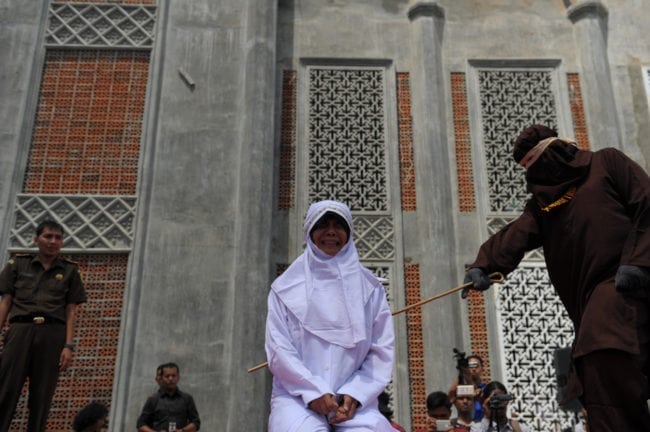
A woman is caned in Aceh, Indonesia, where Sharia law is in effect (CHAIDEER MAHYUDDIN/AFP/Getty)
“In recent years, this level of hostility that LGBT+ people are facing, is unprecedented.”
Chhoa-Howard added that the new government, which came to power in May, had spent a lot of time attacking the LGBT+ community, as “a distraction from other issues affecting the country.”
“The fact that they’re focusing on this instead is very worrying,” said the researcher.
In a statement, she added: “This is a terrible day for LGBTI rights, and indeed human rights, in Malaysia.
“To inflict this brutal punishment on two people for attempting to engage in consensual, same-sex relations is an atrocious setback in the government’s efforts to improve its human rights record.
“The caning of the two women is a dreadful reminder of the depth of discrimination and criminalization that LGBTI people face in the country.”
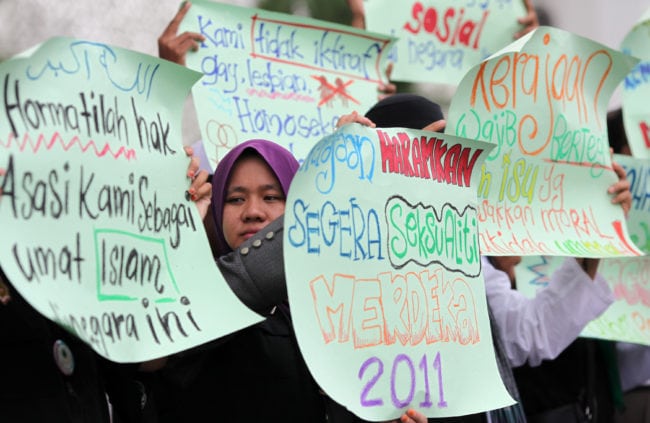
An LGBT+ protest in Shah Alam, near Kuala Lumpur (MOHD RASFAN/AFP/Getty)
Chhoa-Howard said it was “a sign that the new government condones the use of measures that amount to torture or other cruel, inhuman or degrading punishment, much like its predecessor.”
“As long as draconian legislation which criminalises Malaysians based on their sexual orientation and gender identity remains on the books, LGBTI people will continue to be at risk of this type of punishment,” she continued.
“People should not live in fear because of who they are who they love – the Malaysian authorities must immediately repeal repressive laws, outlaw torturous punishments, and ratify the UN Convention against Torture.”
State executive council member Satiful Bahri Mamat told Reuters: “Sharia criminal procedure allows the court to determine where the sentence will be carried out, and requires that it must be witnessed by a number of other Muslims.”

State executive council member Satiful Bahri Mamat (second from right) (Uztaz Saiful Bahri Mamat/facebook)
He insisted that the caning was “not intended to torture or injure,” adding that “the reason it is carried out in public is for it to serve as a lesson to society.”
This echoed the words of Judge Kamalruazmi Ismail, who told the women during their sentencing that “adequate punishment must be meted out so that this becomes a lesson and reminder to not just the two of you, but to members of society.”
Save Malaysian LGBT Community, an activist group in the country, told PinkNews that queer people were “receiving threats from the local community.”
Justice for Sisters (JFS) and Sisters in Islam, two other Malaysian pro-LGBT+ groups, said in a joint statement that the lashings constituted “a travesty and a grave miscarriage of justice.”
JFS had already called the punishment “a gross violation” of the women’s “dignity and human rights,” which, the group added, “amounts to torture.”
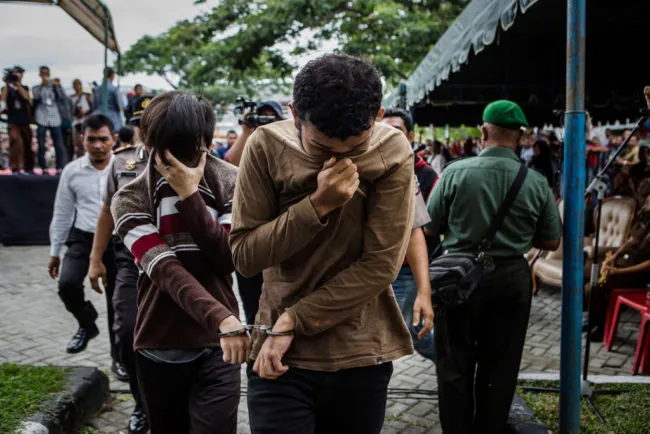
Gay men in Indonesia being led to be lashed 83 times (Ulet Ifansasti/Getty)
Malaysia is currently embroiled in a political furore over LGBT+ rights, sparked by government minister Mujahid Yusof Rawa’s order to an arts festival to remove its portraits of local queer activists last month.
After this inflammatory decision, Malaysian police raided a gay bar in the country’s capital of Kuala Lumpur.

Mujahid Yusof Rawa (Dr Mujahid Yusof Rawa/facebook)
Authorities have said the police action was carried out to “mitigate the LGBT culture from spreading into our society.”
The country has long been hostile towards LGBT+ people. In April, a Malaysian university held a contest to convert gay students.
The Universiti Sains Malaysia, based on the island of Penang, advertised the competition as “a campaign to invite friends who have [a] disorder in [their] sexual orientation to return to their natural nature in a worthwhile way.”
This came just two months after a newspaper in the country published a checklist which provided guidance about “how to spot a gay.”
Malaysia is not the only country in southeast Asia where citizens can be punished under Sharia law for having gay sex.
Last year in Indonesia, a gay couple was sentenced to 83 lashes each as a legal punishment for having consensual sex.

